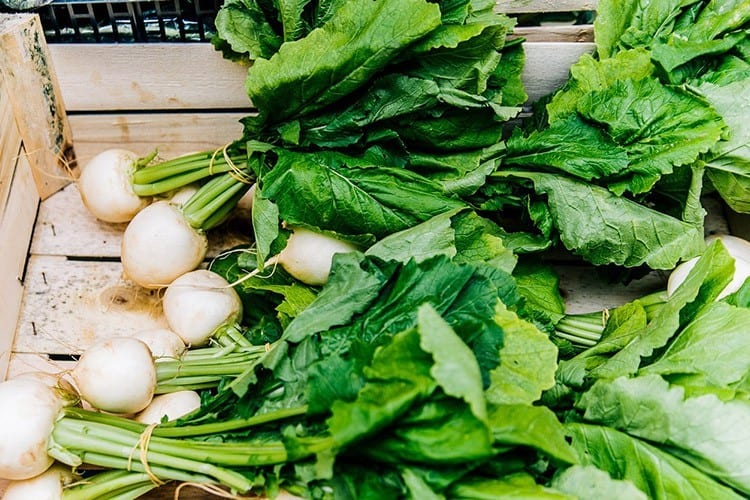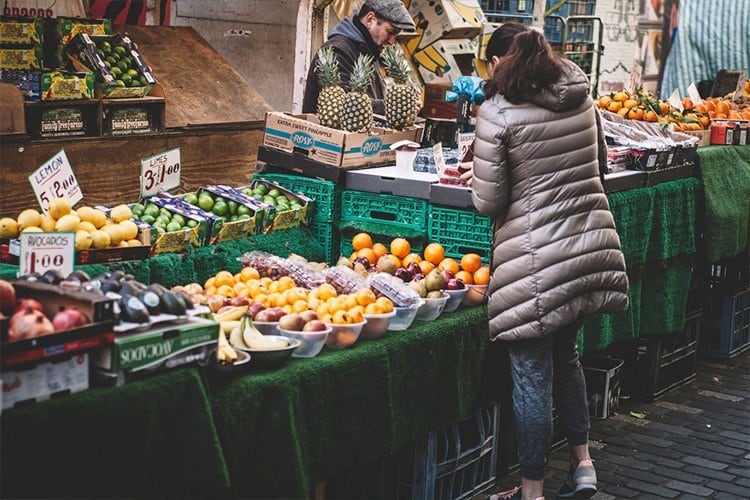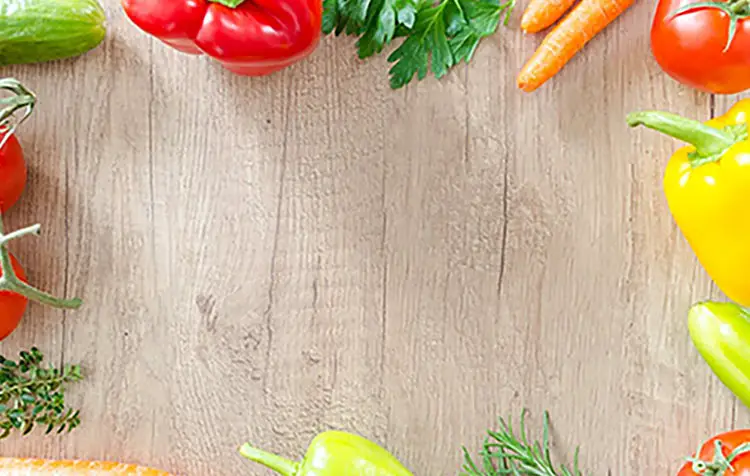How to use the Reduce food waste and what exactly is food waste anyway? It's crazy that we throw away more than a third of all food produced worldwide, while there are also at least one billion starving people on our planet. In this post, you'll learn causes and facts of food waste in Germany and around the world, and 16 tips you can use to reduce your personal food waste. Let's go!
Here is another short Table of contentsthat you can use as a guide:
Food Waste Facts & Figures

Every year, around 1.3 billion tons₁ of food are thrown away worldwide. That's more than a third of the food produced worldwide. Food waste is a massive problem. To make this tangible, I'm now going to show you some facts & figures about food waste in Germany, Europe and around the world.
Food waste in Germany
In Germany, we actually manage to throw away 18 million tons of our food. This corresponds to around one third of the food consumption in Germany of around 54.5 million tons.₂ Here are more facts & figures on food waste in Germany:
- 1,127 t of food we lose per hour
- More than 2.6 million hectares of land are farmed to end up in the garbage can
- 800,000 t of food goes into the trash unopened and untouched
- Every German throws away the equivalent of about €300 worth of food every year₃.
- 48 million tons of greenhouse gases are emitted for nothing
- 39% (7.23 million t) of food waste is caused by the end consumer
- About 5% (0.98 million tons) of food waste is due to crop losses
- Approximately 60% (18 million tons) of discarded food occurs from producer to bulk consumer - This food is lost along the value chain
- 19 t of food is lost per minute
Food waste in Europe
Food waste in Europe deals with about 88 million tons per year.₄
- About 173 kg of food is thrown away per person
- Dutch have the largest share (512 kg) of food waste per capita
- Slovenia (72 kg) has the smallest share of food waste per capita
- 5% of food waste is due to commerce
- 12% of food waste is caused by the restaurant industry
- 30% of food waste go to agriculture & processing.
- 52% of food waste is attributable to private households
Food waste worldwide
Globally, food waste comprises about 1.3 billion tons. This corresponds to about 30 - 40 % of the food produced annually.
- Approximately 180 - 190 kg of food is wasted per capita
- Every day per capita consumed 2000 kilocalories (and harvested 4600 kilocalories)₅.
Consequences of food waste

As you can see from the facts & figures, food waste is gigantic. But which Effects and consequences does the negligent handling of the food produced actually have? We divide them into ecological and ethical consequences₆:
Ecological consequences of food waste
The fact that we throw away one third of all food produced is responsible for around 3.3 gigatons of CO2 emissions. After the U.S. and China, global food waste is therefore the third largest climate polluter. Food production requires valuable resources (e.g. arable land, Water, fertilizer, Energy, processing services and transport), which we have of course senselessly wasted with every food thrown away. However, not only production, but also utilization and removal result in resources and high costs. Agriculture is responsible for nearly 70% of all endangered species and we actually waste about a third of all food produced. This food waste simply has incredibly far-reaching consequences for our environment and must not be allowed to continue.
Ethical consequences of food waste
When we throw away food, it doesn't just have consequences for the environment. Food waste also impacts our society. We know that we throw away about a third of the food we produce, yet there are also about a billion hungry people on our planet. It is incredibly disrespectful behavior to throw away a large portion of our own food while people in other places are struggling to survive and need that very food. By buying massive amounts of food and eating much less, the price of that food also goes up. Even a more conscious purchase of each individual, can reduce food waste and also mean positive effects for the world population.
Food waste causes

Around 60% of the food wasted in Germany alone is lost in the course of the supply chain. Food waste is caused by the fact that food has to be sorted out due to immaturity, pest infestation or diseases. Here I would like to give you a small list of some possible, main Causes of food waste show
Causes of food waste in production:
- Food was harvested unripe
- Pests have infested food
- The food has diseases
- Inadequate transport facilities
- Storage capacities not sufficient
- Cooling possibilities limited (after harvest and during processing)
- Poor hygiene
Common causes of food waste in retail:
- Sorting out unsold, perishable products
- Deviation of shape, color and size
- Special offers & special prices
These are the causes of food waste in the home:
- Lack of purchase planning in the household
- Best before date is mistaken for use by date
- Lack of stock planning
- Incorrect storage
In Germany, by the way, food is thrown away because...
- the expiration date has passed or the goods are spoiled (84 %)
- too much food was purchased (25%)
- because the package was too big (19%)
- the product does not taste / does not deliver what it promises (16%)
The causes of food waste are manifold and, in sum, a huge problem. But what can each and every one of us do about it? To answer this question, I have written down my best tips against food waste.
16. tips against food waste
Now here's the full broadside of good tips against food waste. With these 16 measures you can reduce your personal food waste.
1. it is called MINIMUM shelf life until...
Since we can get any food anytime, we tend to throw it away one day after the best-before date. But food can usually be enjoyed for much longer, because the date only gives an indication of when the food may no longer be edible. To be able to reduce food waste, you should simply take a close look at the food and estimate the shelf life yourself.
2. leftovers for soups & smoothies
Do you happen to throw away brown bananas or mushy kiwis and tomatoes? There's no reason to. Do you know how you can reduce this food waste? By using these leftovers for soups or smoothies, for example. These foods may no longer look so pretty, but they are still edible. In a tomato soup or a homemade smoothie made from bananas and kiwis, nobody knows what the fruit looked like before. And it tastes the same as always. Reduce food waste? Check!
3. take food from the restaurant
If you don't finish your meal at the restaurant, that's no reason to throw it away. To reduce this type of food waste, simply have your leftover food from the restaurant wrapped. You will usually be given polystyrene packaging. If you want to do this plastic-free, simply take a stainless steel can with you to eat in. So if you know yourself well, you can prepare this wonderfully 😉.
4. bought too much? Invite friends!
If you've bought too many potatoes, mushrooms, carrots or spinach, that's no reason to throw away the excess food. Instead, simply invite your friends to cook and eat together to reduce food waste. In the same way, you can also just have a plastic free party or even ask your neighbor if he would like to have the food. This is one of many important tips against food waste.
5. throwing away crooked food is nonsense!
Do crooked carrots or potatoes taste worse? Of course not. Nevertheless, the average consumer is used to beautiful fruits and vegetables and gives crooked, ugly foods a wide berth. Unfortunately, these are therefore usually thrown away. To be able to reduce this food waste, we should buy these very crooked foods. I am a real fan of Etepetewhere you can get discarded food at a good price. An absolute win in the fight against food waste.
6. use apps against food waste
At the bakery or in restaurants, throwing away food is completely normal. Cool that there are apps that can help you reduce this unnecessary food waste. One of them is Too Good To Go. In this app, excess food and surplus food are offered for sale for a cheaper price. This app gets consumers and vendors to massively reduce food waste and throw away less food.
Download app from Android PlayStore
7. buy regional and seasonal foods
In this case, of course, the food waste does not happen directly in your home, but you can still reduce the general food waste. Prefer regional and seasonal foods, because they are not damaged during the often long transport from abroad and can therefore be sorted out. In addition, you can Purchase of regional products also expect a longer shelf life, and suppliers know exactly what has happened to the food so far. Buying food regionally and seasonally is a small adjusting screw in your head, but one of many important tips against food waste.
8. store food properly
Foodstuffs differ from one another and must therefore be stored differently so that they can be kept for as long as possible. Some foods last longer in the refrigerator, others must be stored in the light. Here, for example, are a few tips to make your food basically last longer:
- Such natural beeswax cloth use instead of cling film
- Potato and fruit crates (line with paper and store one on top of the other; also suitable for fruit)
- Dry vegetables (e.g. chopped mushrooms, zucchini and tomatoes)
- ... there are thousands more cool options!
9. pre-plan shopping against food waste
What food do you still have in stock at home? What do you want to cook today? Just answer a few questions like these and be sure which foods you really need. Only then you go off, to ideally plastic-free shopping. This will make your wallet happy and you can reduce your personal food waste.
10. eat up provides good weather!
Another of many good tips against food waste is, as grandma used to say, "Eat up and you'll have nice weather!" - In addition to nice weather, this is how you manage to reduce your food waste. You should only cook as much as you can and want to eat. Learn to judge your hunger better. Of course, you often have a little food left over after cooking. But why should you throw that food away? Keep it in the fridge instead. Many dishes can also be easily freeze plastic free.
11. preserving & freezing food
If you've bought too much groceries or can't make it all at dinner, you can simply boil down or freeze the rest of the food. If the strawberries are getting too soft, why not make some delicious strawberry jam and freeze it for later? There are so many ways to reduce your food waste.
12. buy food consciously (psychology)
This tip against food waste is primarily about your behavior when shopping. In the supermarket, for example, the art of advertising psychology ensures that you usually put more in the shopping cart than you want. By shopping consciously, however, you can reduce your food waste. I can give you the following tips against food waste when shopping in the supermarket:
- Trade shopping cart for shopping basket (or burlap bag): There is much more space in the shopping cart and this tells your subconscious that something is missing. This is simple psychology and if you know it, you can reduce your personal food waste.
- Special offers especially reconsider: Bulk discounts (XXL packages, 3 for 2, etc.) may seem cheaper at first. But if you buy too much as a result, you may also throw away some food. Again, think and shop consciously. This is one of the most important tips against food waste.
- Buying "almost expired" food: If you know you're going to cook or eat them today, you can simply buy foods that expire promptly and are often marked down. So you also reduce the food waste of the supermarket. Because with high certainty the food would have ended up in the trash.
- Buy only what is on your shopping list: The classic, well-considered shopping list is, in my opinion, the safest way to make sure you don't buy too much. Buy exactly only what you wanted to buy.
13. say NO to throwing away food and YES to increasing food!
Why would you throw away seemingly superfluous foods when you can simply multiply them. Ginger is one such example: If you simply put ginger on the windowsill, the plant will multiply by itself. Or if the potatoes are already sprouting, you can just plant them and get new potatoes. We have become so comfortable that planting already seems so far away. Yet it's natural, cheap, and helps you reduce your food waste. Here is another article about Healthy plants to grow yourself.
14. completely recycle food
Of course, this is not always possible, but it is a direct measure to reduce your personal food waste. Example broccoli: Many cook only the florets of this food, but the stalk tastes just as good! You can also eat the apple completely. If you want to reduce your food waste, you should simply eat everything that is edible in a food.
15. inspire others against food waste
You know the problem of food waste very well, at the latest after this article. Use your knowledge and your personal attitude to inspire others. Online and offline. On social media like Facebook, Pinterest or Instagram, you can reach a lot of people in one fell swoop. Talk to your friends at home about food waste, too. Simply advocate for less food to be thrown away. You'll make a difference.
16. foodsharing against food waste
At Foodsharing you share food with each other instead of throwing it away. On Foodsharing.de everyone can offer surplus food and also order it. I personally love the concept of foodsharing, as it allows everyone to reduce food waste and save a lot of money. And the idea is growing and growing. The more that join in, the better we can reduce food waste. Here is a short video that explains the principle of foodsharing in detail.
Reducing food waste is incredibly easy!
The fact that we throw away more than a third of our food, although it is urgently needed elsewhere, is inconceivable. But just such facts and figures, the causes and also the consequences for the environment and society are known. I hope that my tips against food waste will help you personally to throw away significantly less food. I am looking forward to your comments with your questions, your own experiences and of course your tips on food waste.
Best regards,

PS.: In the article Plasticfree lifestyle you can additionally learn how to make less plastic waste as well!
References:
₁ https://www.muttererde.at/fakten
₂ WWF study "The big throwaway" http://www.wwf.de/fileadmin/fm-wwf/Publikationen-PDF/WWF_Studie_Das_grosse_Wegschmeissen.pdf, June 2015.
₃ The figures are based on information from the Food and Agriculture Organization of the United Nations (FAO), the Save Food study by film manufacturer Cofresco and the German Federal Ministry of Food, Agriculture and Consumer Protection (BMELV).
₄ http://www.europarl.europa.eu/resources/library/images/20170512PHT74427/20170512PHT74427-cl.jpg)
₅ https://www.proplanta.de/Agrar-Lexikon/Lebensmittelverschwendung+-+figures+udn+facts_ll1331734059.html
₆ https://www.zugutfuerdietonne.de/warum-werfen-wir-lebensmittel-weg/welche-folgen-hat-das







Hello Christoph,
First of all super contribution, you have done a good job.
Super content !!!!
I find the topic of food waste is quite an interesting topic that you should definitely follow with seriousness. Recently I read a post about reducing food waste with a vacuum cleaner. Here were super points listed as this device supports you in saving food and you should actively go against it. I link times the page, because it is a very interresanter article that you can read through with pleasure times.
Mfg
Thorsten
Hi Thorsten! Thank you for your feedback, very exciting 🙂
Many greetings,
Christoph
Hi Christoph,
It is an interesting but also miserable topic. Have 38 years ago made an apprenticeship as a food vendor, and even then we had to dispose of food. At that time, however, we still had the pig bucket that was picked up twice a week, is no longer allowed today. The problem was mainly the customers who always had to test the goods for ripeness with their fingers. Sometimes I would have loved to throw these people out of the store on edge. Unfortunately, it is not much different today than it was back then. As for the producers, a large amount of the field directly disposed of to keep prices high, I find the biggest mess.
Keep up the energy for your project and greetings from Switzerland Peter
Hello Peter, thank you for your comment. What do you mean by "disposed of directly from the field" and why?
Stay clean,
Christoph
Hello Christoph,
Thank you for this article,
I am currently writing a report on the topic of food waste for my university thesis. Therefore the article is very helpful for me...
Is it possible to prove the given numbers in any way? unfortunately, I have not found them anywhere calculated in such detail....
(it is about the following section):
1,127 t of food we lose per hour
——————-
19 t of food is lost per minute
I look forward to your feedback !
Thank you very much,
Kind regards ,
Samanta
Hi Samanta, thanks for your feedback!
Below are all sources deposited. There are also some facts that have not been footnoted. Just look through them, otherwise search at Statista, there are also many facts about food waste.
Good luck 🙂
Christoph
Thank you for this article! As energy experts, we celebrate every contribution to food rescue. Because whoever saves food, as you write at the beginning of the article, also saves valuable energy. We just did an interview about this on our blog with food rescuer Daniel from the association Shout Out Loud e. V.. Daniel goes into more detail about the energy aspect and explains, for example, which foods require a particularly large amount of energy to produce and how this affects the carbon footprint. He also explains at which points in the production chain energy is needed at all.
Have fun continuing to save food and save energy!
Hi 🙂
Thank you for your comment. Great, you are doing important educational work!
Stay clean,
Christoph
Hello Christoph,
Thank you for this article,
I am currently writing a report on the topic of food waste for my university thesis. Therefore the article is very helpful for me...
Is it possible to prove the given numbers in any way? unfortunately, I have not found them anywhere calculated in such detail....
(it is about the following section):
1,127 t of food we lose per hour
——————-
19 t of food is lost per minute
I look forward to your feedback !
Thank you very much,
Kind regards ,
Samanta
Hi Samanta,
You've chosen an exciting topic! 🙂
I used the sources in the source list at the bottom of the article. It's best to check Statista for 100% reliable numbers.
Many greetings
Christoph
Fortunately, I can check off most of the tips! But I still have to work on two things...
Top Jasper, keep up the good work. This is also a development process 🙂
Best regards,
Christoph
An article that initially put me in a bad mood. The numbers are definitely frightening. However, I can check off almost all of the tips to ease my conscience. So quickly but not try out, I will the apps. But thanks for the motivation to stay on the ball!
Hi Peter! Yes, the figures are simply frightening. Great that you're already implementing the tips! 🙂
Why wouldn't you want to try the apps? They work flawlessly and help reduce food waste even more.
Always happy to help 🙂
Best regards,
Christoph
Comments are closed.